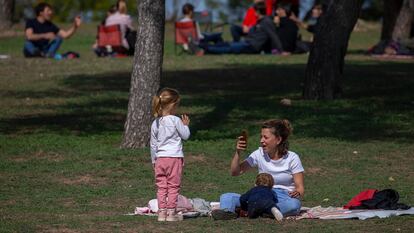Europe moves to limit social contact to household bubbles amid surge in coronavirus cases
The new restrictions are aimed at preventing a total lockdown and mean that people can only socialize with a limited number outside of their home

After an afternoon playing in the Parc del Guinardó in Barcelona last Sunday, four-year-old Íria invited Emma to spend the night at her house. It was the first time she had wanted a sleepover with a friend and the girls' parents were amused by the initiative. “We agreed to talk throughout the week to see if they could do it on Saturday, but in the end, we had to leave it,” explains Emma’s mother, 40-year-old journalist, Eva Cervera.
Last Wednesday, the Catalan regional government recommended that residents reduce social contact as much as possible and avoid meeting up with people from outside their immediate household. In the city of Ourense, in Spain’s northwestern Galicia region, residents cannot socialize with anyone outside of their household, meaning any activity, whether a walk or dinner out must be done with someone they live with.
In the current situation, either we move towards bubbles or we have to put society on hold againDaniel López Acuña, a former official at the World Health Organization
In the rest of Europe, similar measures are being taken. In Ireland and the largest cities in the United Kingdom, including London, indoor gatherings of people from two or more different homes are banned. In Germany, when a region reports more than 50 new cases per 100,000 inhabitants in a week, gatherings are limited to a maximum of 10 people from two households. And in Belgium, households can invite up to four guests to their home, but they must be the same four people over a two-week period.
Although there are variations between different countries in the pace and exact detail of the measures, Europe is moving towards a new form of coexistence based on household bubbles. It is the last resort to slow the relentless advance of the coronavirus and avoid a strict lockdown. The World Health Organization (WHO) and the European Union warned last week of the urgent need to “flatten the curve” to prevent such a measure, which saw millions of people confined to their homes during the first wave of the coronavirus.
“Given the dramatic spikes and the lack of a vaccine or effective treatments, governments have discovered that their best weapon is sociological,” explains Daniel López Acuña, a former official at the WHO. “And this means reducing non-essential interactions to a minimum.”
According to López, the reason the coronavirus transmission rates have become so high is largely due to the lack of restrictions on social events and large gatherings. While the new restrictions are somewhat unfair to those who carefully observed the safety measures, there is little alternative given the rising number of cases. “In the current situation, either we move towards bubbles or we have to put society on hold again,” he says, in reference to the home confinement measures introduced at the start of the pandemic.
What you gain in security with regard to the virus, you lose in something as intrinsically human as social relationshipsPsychiatrist Enrique García Bernardo
Epidemiologist Joan Ramon Villalbí, from the Spanish Association of Public Health and Health Administration (SESPAS) agrees: “The trend is such because the more interaction there is, the more the virus spreads.”
Villalbí believes it is inevitable that Europe will introduce more restrictions on social activity if infection rates continue to rise, adding that the outlook for Holland, Belgium and France is looking worse than it is for Spain. “With fewer cases, you can control the situation with good tracking and diagnostic facilities,” he says. “But if transmission rates are high, if you don’t start applying restrictions, you can expect it to keep growing until it spikes. And then you have to resort to the toughest measures.”
Sociologist José Antonio Noguera, professor at the Autonomous University of Barcelona, stresses that in some countries in Central and Northern Europe, the sociological trend is towards smaller families and people living alone. “In these more individualistic societies, measures of this kind are easier to follow,” he says. “But in others, such as Spain, families tend to be larger and social interaction tends to be more intense. So the impact these restrictions have on people is far greater.”
Noguera believes that the greater social and personal cost means that people tend to let their guard down as soon as the restrictions are lifted. The positive aspect of this reversal is that it facilitates the return to normality. However, as Noguera points out: “There is a risk that what we should be doing as a society and what we will actually do is out of sync. Sure, many people follow the rules laid down by the authorities and significantly reduce their social interactions, but it is likely that they will not do not so to the extent that the recommendations or rules require them to.”
Technology not enough
According to psychiatrist Enrique García Bernardo, the personal toll of social restrictions is important. “What you gain in security with regard to the virus, you lose in something as intrinsically human as social relationships,” he says. “And this is something that new technologies and social networks cannot make up for, although they can be helpful in the short term.”
The best strategy for dealing with the restrictions is to nurture the autonomy of the household group as much as you can. “There are those of us who need to spend all day relating to others, but also those who want just the opposite,” Bernardo adds. “The key is maximum respect for differences and individual needs within the bubble, otherwise there is tension and conflict.”
As Bernardo points out, the first wave of the coronavirus showed that restrictions can exacerbate anxiety and depression. “But even if this is very unpleasant for those suffering, the symptoms are minor,” he says, explaining that individual crises often diminish in the face of a collective crisis. “As psychiatrists saw in World War II, when the guns go off, there is no neurosis,” he says.
English version by Heather Galloway.
Tu suscripción se está usando en otro dispositivo
¿Quieres añadir otro usuario a tu suscripción?
Si continúas leyendo en este dispositivo, no se podrá leer en el otro.
FlechaTu suscripción se está usando en otro dispositivo y solo puedes acceder a EL PAÍS desde un dispositivo a la vez.
Si quieres compartir tu cuenta, cambia tu suscripción a la modalidad Premium, así podrás añadir otro usuario. Cada uno accederá con su propia cuenta de email, lo que os permitirá personalizar vuestra experiencia en EL PAÍS.
¿Tienes una suscripción de empresa? Accede aquí para contratar más cuentas.
En el caso de no saber quién está usando tu cuenta, te recomendamos cambiar tu contraseña aquí.
Si decides continuar compartiendo tu cuenta, este mensaje se mostrará en tu dispositivo y en el de la otra persona que está usando tu cuenta de forma indefinida, afectando a tu experiencia de lectura. Puedes consultar aquí los términos y condiciones de la suscripción digital.









































